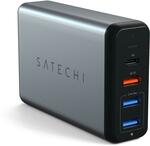This popular deal is back, albeit $4 more from last time
I suppose the brand is more reliable than Blitzwolf's counterpart and plus u get local warranty too.
This would be great for travelling aboard but not that we can in the foreseeable future, sadly.
Enjoy the deal :)
Edit: remove the word Chinese, I mean no offence as they make good products too.


Is this ok for charging a 2016 13 inch MacBook Pro?